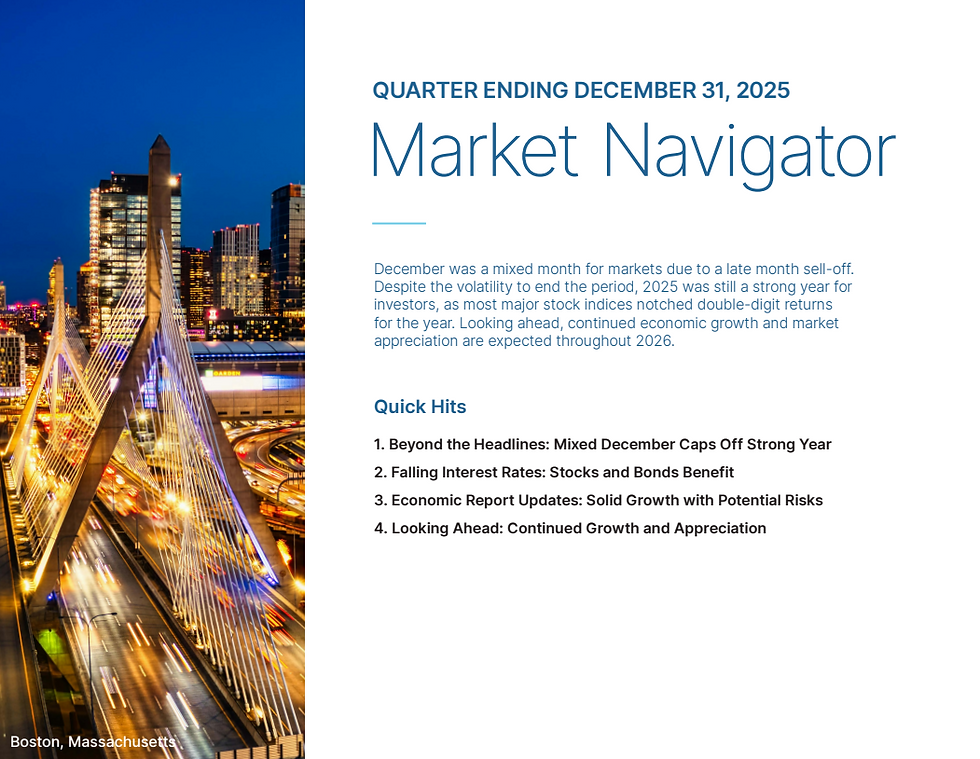The Government Shutdown: What It Means for You
- Caitlin Trites
- Oct 2, 2025
- 3 min read
Presented By: Kemple Financial
As of midnight Tuesday, the U.S. government shut down after lawmakers were unable to reach an agreement on a temporary funding plan. This is the first shutdown since December 2018. While federal workers are affected—some furloughed and others working without immediate pay—most benefits, such as Social Security, Medicare, and Medicaid, will continue as usual.
For investors, the key question is: what does this mean for markets? Let’s look at what history tells us.
Shutdowns Are Usually Short
In the last 50 years, there have been 21 shutdowns. On average, they lasted just over a week. The bulk of these happened decades ago, under Presidents Carter and Reagan, and most were short-lived.
Since the mid-1990s, there have been six shutdowns. Three of those lasted a bit longer—16, 22, and 35 days. The longest one was in late 2018, and it stretched into January 2019, during the first Trump administration. Even then, parts of the government stayed open because not all funding bills were affected.
Political disagreements often drive these events, but public pressure usually encourages lawmakers to reach a compromise before too long. So, a resolution could occur at any point, as voters call for common ground and a way to reopen the government. Conversations are already happening in the Senate that could lead to a short-term deal and more time for further negotiations between the two parties.
What This Shutdown Is Really About
The shutdown is happening because lawmakers couldn’t agree on how to fund what’s known as discretionary spending — things like defense, government agencies, and certain public services. This portion of the budget makes up about a quarter of total government spending and has to be approved by Congress each year. Figure 1 shows that defense spending is almost entirely discretionary and makes up a significant part of the government’s total discretionary spending.
The rest of the budget, called mandatory spending, covers programs such as Social Security, Medicare, Medicaid, and student loans. These programs continue as usual, regardless of the shutdown.
For government workers, the effects are very real. Roughly 750,000 employees may be temporarily furloughed, while others must continue to work without pay until funding is restored. But for most Americans, the essential programs they rely on won’t be interrupted.

How Markets Usually React
It can be hard to separate the effect of a shutdown from everything else happening in the economy at the same time. Looking back, markets have often reacted more to broader conditions—like inflation or Federal Reserve policy—than to the shutdown itself.
Figure 2 shows how the S&P 500 performed during and after past shutdowns. The results are mixed—sometimes the market slipped, sometimes it gained. But overall, shutdowns haven’t left lasting effects.

What It Means for Investors
Despite the shutdown, recent data points to a healthy market backdrop:
U.S. stocks just finished their fifth straight positive month, with some indices hitting record highs.
The economy has been stronger than expected, with growth and corporate earnings both beating forecasts.
The Federal Reserve has started lowering interest rates after a long pause, which often supports both stocks and bonds.
One short-term wrinkle: During the shutdown, some government reports (like the eagerly anticipated October 3 jobs report) won’t be released. That can add uncertainty to the news cycle, but it doesn’t change the fundamentals.
Looking Ahead
History shows that shutdowns rarely derail markets, and today’s fundamentals remain supportive for long-term investors. While headlines may cause day-to-day swings, the best approach is to stay focused on your long-term plan rather than making sudden changes.
Kemple Financial is located at 601 N Main Street East Longmeadow, MA 01028 and can be reached at (413)507-3600. Securities and advisory services offered through Commonwealth Financial Network®, Member FINRA/SIPC, a Registered Investment Adviser.
Authored by Chris Fasciano, chief market strategist at Commonwealth Financial Network®.
© 2025 Commonwealth Financial Network®




Comments